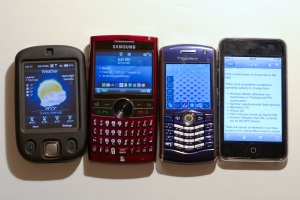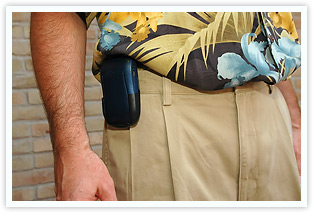About 6 months ago, I received my brand new 32GB Ipod Touch. It completely revolutionized my life in terms of the productivity capabilities built into such a small device. More specifically, there wasn’t anything overwhelmingly new in terms of what the iPod (or iPhone) could deliver, but instead, it was the implementation, accessibility, and connectivity of it all. The things that could be found in the app store was an eye-opener for myself and scores of others out there, and it lead to the seeking out of further enhancement of my other devices.
Fast forward and I’m now clearly looking for more. There are still a number of limitations of the iPod Touch that are capping my mobile productivity potential. Attempts have been made to fill this gap with the Blackberry (see here – link to Blackberry as laptop replacement) but it hasn’t been overly successful to date. With that in mind, I recently purchased my first netbook: An Acer Aspire One (AAO150) 8.9″ Intel Atom based netbook.

Aspire One AAO150
Acer Aspire One
The netbook uses a traditional 160GB harddrive and has the now standard 1GB of RAM, USB ports, VGA output and an upgraded 6-cell battery (the thing lasts for 5 1/2 hours based on early tests!). It comes with a pre-installed version of XP and I’ve added a USB boot disk for xPud, a stripped down linux OS for quick access to internet and a few basics on the go. There’s not much more to get into here as, aside from the diminuitive size, it essentially resembles a typical laptop in terms of use and functionality. Oh but the size is phenomenal! Easy to carry, the psychology of using this is much different from your standard 14″ – 17″ laptop as there’s a convenience in size and weight that brings it closer to the appeal of the smartphone than a computer. With that said, it got me thinking about the similarities and differences between this and the Touch, and had me asking whether or not the benefits make it worthwhile adding yet another device into the rotation.
The Comparison
Size: Clearly, the Touch wins out based on it being fully pocketable. There’s also no additional action required to get it to use versus having to pop open the screen on the netbook. This does limit usage in certain situations like on a crowded subway, standing and waiting at a bus stop and so on. Nothing new here. As for the netbook, the 8.9″ screen takes some getting used to, and some of you may prefer the 800 x 600 resolution over the higher 1024 x 600 standard to make the font size bigger.
Keyboard: The keyboard will be another thing to consider. I tested out the Asus Eee PC 900HA and compared to that one, this keyboard is large and spacious. However, you’ll still have to make an adjustment when coming from a regular sized on larger laptops and stand alone keyboards. The biggest issues I’ve been having so far are with the peripheral keys like the shorter SHIFT key and the more narrow ENTER key. Of course, there are far bigger fish to fry when comparing to the iPod. There’s actually no comparison as I’m fairly error-prone with it even in landscape mode. On top of that, running music in the background will slow things down enough that a tiny lag is created and can cause keys to be missed. I definitely have to run all text through a spell check before making it final. Even with a hard keyboard like the one found on the HTC Touch Pro, it’s a different action with the thumb presses. It’s just not as efficient no matter how nice the keypad is. One day we’ll test this theory against the Blackberry Bold, which is said to have one of the best keypads out there.
Function: Wow, this is slowly becoming a comparison of the obvious, but the netbook wins out for it’s fully functioning Windows XP OS. You can do anything with it – photo-editing, office documents, torrents if you were so inclined, etc. This is a significant area of weakness with the Touch. It can do all of these things, but with severe limitations. Partly due to device memory, and partly due to ergonomics. So what are the specific processes that can’t be substituted effectively?
- Text editing. I’m about to download Documents to Go for the Touch, but in reviews that I have read so far, there are some memory lags that make the application slow. This will change with the new supped up iPhone 3GS, but at the moment, is a main concern. Your thoughts are about flow, and if there’s a break to that, you won’t be nearly as effective. Conversely, I’m just thinking typing right now on the netbook, and haven’t felt limited by the technology. Instead, things are as it should be, with the biggest restriction being the formulation of thought to paper.
- Evernote. Yes, the Ipod Touch evernote application is the absolute best one out there, but it suffers from the same issues with text editing above, and also flexibility that the desktop app allows for. I use this for everything, including blog drafts and so am served well by having the best tool out there.
- Web Browsing. As we wait for embedded flash for the Touch, the browsing experiencing will still always be limited. The text can be hard to read on the small screen and the wifi has actually throttled down with the new 3.0 OS. I can’t tell you how annoying that spinning load icon is – everything just takes longer. Again, will the 3GS be better? Full control of the wireless card power makes the connection with the netbook absolutely brilliant. No complaints with browsing either, as I use Firefox and F11 to give me full screen viewing on the 8.9″ screen. I’m sure this will be subjective to others, so you should try it instore first to see if it’s tolerable for you.
- File Storage. Not talking about internally, but the ability to move files in and out of the device and even use a USB thumb drive for backup and making things portable. The iPod of course connects to iTunes and can be backed up there, and application such as Air Sharing and others can help you set it up for file transfers. But nothing beats the ease of use of having standard USB ports, of which there are 3 on this particular netbook. It also has a storage expansion slot for using an SD card as a separate solid state drive.
- Multi-tasking. Can’t do it properly on the Touch. ‘Nuff said.

Netbook and iPod Touch...on the kitchen counter...
Conclusion
As I wrap this up, I’m noticing a minor twinge in my left index finger near the knuckle. I would suspect it’s my hand getting used to the smaller sized keyboard. It’s definitely not perfect, but a reasonable compromise between size and function, and puts it ahead of the iPod Touch as the ultimate productivity travel companion. A couple more iterations of the iPhone/Touch and we could have a proper battle on our hands, but that won’t happen unless we get: 1) bluetooth or wired external keyboard expansion, 2) more memory (yes, probably even more than what’s on the 3GS), and further enhancements to the OS. So basically, until Apple makes a “Transformer” version of their iPod, there will always be room for a netbook in your gadget bag.
I would be interested to hear your thoughts – maybe a differing opinion – as I’m sure this is a topic of conversation of a lot of interest for people right now (if you don’t believe me, google it…).
PSp

